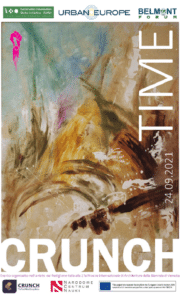Join JPI UE
Faq
FAQ
Please click here for the frequently asked questions we collected.
If you have an additional questions you are welcome to mail us at info@jpi-urbaneurope.eu

The urban landscape is intensively transformed, and precipitation systems, hydrological cycles, the productivity of the ecosystem, energy balance and local climate are all disrupted and modified. The urban Food-Water-Energy Nexus generally describes an approach to complex urban systems that focus on the intersections, hidden efficiencies and potential synergies between sectors and fields that are commonly viewed separately. The CRUNCH project, thanks to its systemic approach, enables the definition of the concept and methodology of the city closed-loop system (Circular Economy based) and provides also a unique collaboration framework for technical and social scientists, small and large businesses, cities, non-governmental organisations and local stakeholders to tackle the current urban challenges and inefficiencies of the food, water and energy sectors.
The CRUNCH scope concentrates on the methodology of collecting knowledge and setting cross-sectoral indicators, which are common for different locations around the world (Taiwan National University). CRUNCH demonstrates how the Food-Water-Energy Nexus can strengthen urban resilience by creating an interconnected knowledge platform with cross-sectorial indicators for a support tool/assessment framework, so-called the Integrated Decision Support System (Uppsala University). All the involved cities (Portsmouth, Gdansk, Miami, Taipei, Eindhoven, Uppsala) take part in experimental Urban Living Laboratories, testing and analysing the models using different scenarios. Eindhoven University approach is to transform the IDSS into a more attractive and understood form that can be dedicated to all city residents and Florida University focuses on the possibilities of how to apply the IDSS to a regional scale.
The experimental tasks of the CRUNCH project in Poland are undertaken at the Urban Initiative Laboratory based on the cooperation agreement between the City of Gdansk and Gdansk University of Technology. They are preceded by the basic research eg: examining, structuring and synthesising the existing knowledge, elaborating comparative analysis model, data modelling, case studies analysis held mainly at the Gdansk University of Technology and focused on the classification of Urban Living Labs and the scalability of the Food Water-Energy Nexus ie: the FWE NEXUS Neighbourhood Model and FWE Nexus Square. The conceptual designs of proposed transferable and replicable urban solutions are finalized in the Non-Invasive Measurement System and Comodal Local Node.
Learn more about the exhibition
Contact CRUNCH
Learn more about the call Sustainable Urbanisation Global Initiative (SUGI)/Food-Water-Energy Nexus
You are currently viewing a placeholder content from YouTube. To access the actual content, click the button below. Please note that doing so will share data with third-party providers.
You are currently viewing a placeholder content from YouTube. To access the actual content, click the button below. Please note that doing so will share data with third-party providers.